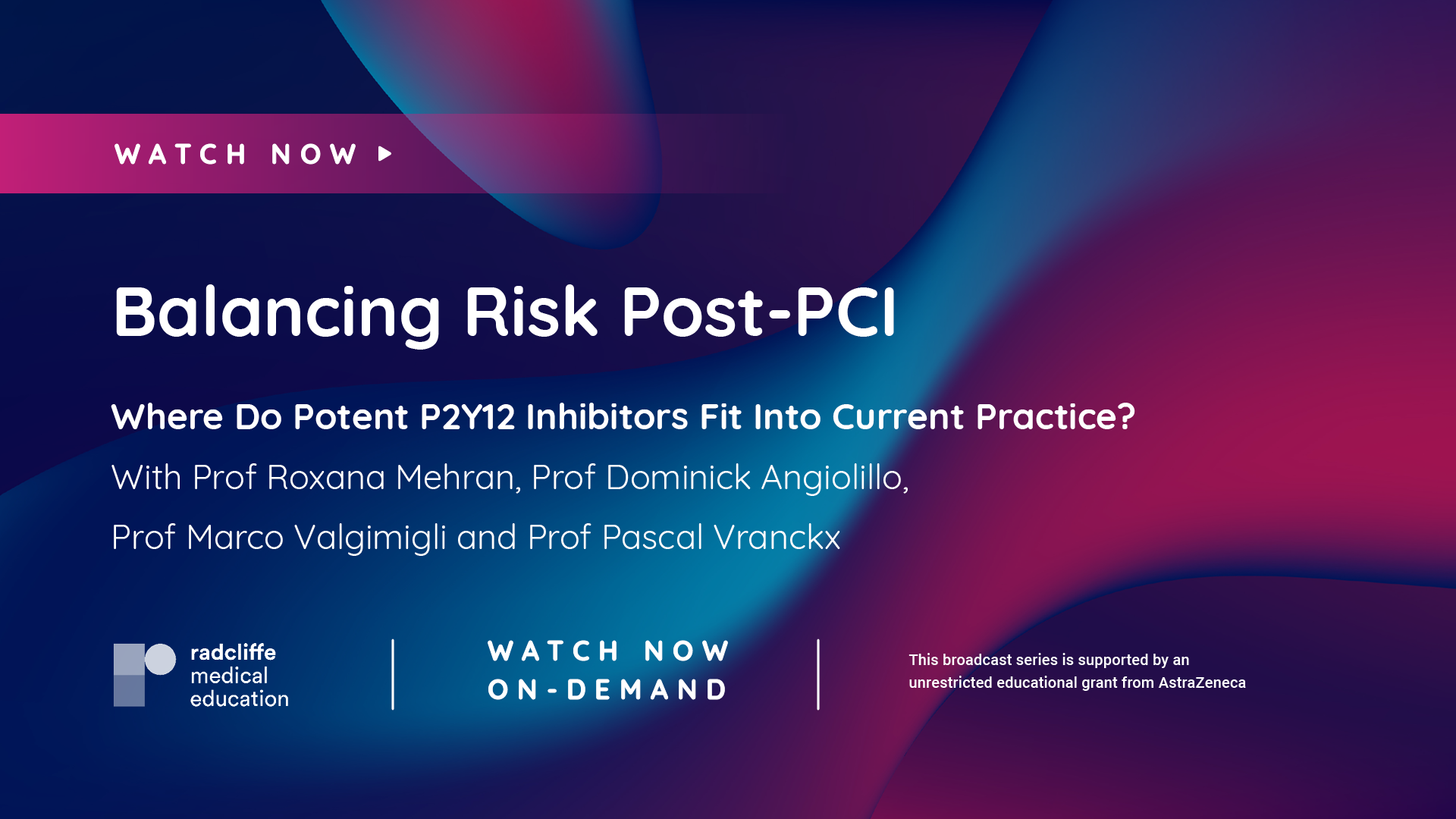Where Do Potent P2Y12 Inhibitors Fit Into Current Practice? - Balancing Risk Post-PCI
Published: 13 October 2022
-
Views:
 16515
16515
-
Likes:
 7
7
-
Views:
 16515
16515
-
Likes:
 7
7
-
 18m 3sPart 1 Clinical Vignette and Panel Discussion Marco Valgimigli, Roxana Mehran, Dominick J Angiolillo, Pascal Vranckx
18m 3sPart 1 Clinical Vignette and Panel Discussion Marco Valgimigli, Roxana Mehran, Dominick J Angiolillo, Pascal Vranckx
Overview
This broadcast series 'Where Do Potent P2Y12 Inhibitors Fit Into Current Practice?' will reappraise potent P2Y12 inhibitors, as evidence accumulates to support their broader use. At this juncture, there is still some uncertainty around patient selection, initiation and long-term management.
The third broadcast in this series, focused on Balancing Risk Post-PCI. In this on-demand version of the live broadcast, Radcliffe Medical Education brings together a global faculty of experts in the field to look at current guidance, the landmark data, gaps in evidence and seeks to provide practical guidance.
Prof Roxana Mehran (Mount Sinai Hospital, New York, US) chairs the proceedings, and is joined by Prof Dominick Angiolillo (University of Florida College of Medicine-Jacksonville, US), Prof Marco Valgimigli (Instituto Cardiocentro Ticino, Lugano, CH) and Prof Pascal Vranckx (University of Hasselt, BE) for a series of insightful presentations and discussions.
You can also catch up on other broadcasts in this series:
Key Learning Objectives
Following the completion of this programme, physicians will be in a position to:
- Apply the use of validated bleeding risk tools across a wide range of patients
- Use guidelines and clinical judgement to select antiplatelet therapy regimens in patients at elevated bleeding risk
- Recall the clinical significance of trial data assessing truncated periods of DAPT
- Prescribe confidently in patients judged to be at elevated bleeding risk
- Recall the safety profiles of different P2Y12 inhibitors
Target Audience
- General Cardiologists
- Interventional Cardiologists
- Nurses and any other allied HCPs
More from this programme
Part 1
Clinical Vignette and Panel Discussion
Part 2
Assessing Bleeding Risk Post-PCI
| 1 session | |
| Assessing Bleeding Risk Post-PCI | Watch now |
Part 3
Optimum Duration of DAPT: Overview of Current Data
Part 4
Bleeding Risk Mitigation - Safety in Clinical Practice and Panel Discussion
Faculty Biographies

Roxana Mehran
Professor of Medicine, Cardiology and Professor of Population Health Science and Policy
Roxana Mehran is Professor of Medicine, Cardiology and Professor of Population Health Science and Policy at the Icahn School of Medicine at Mount Sinai in New York. She is also Director of Interventional Cardiovascular Research and Clinical Trials at The Zena and Michael A Weiner Cardiovascular Institute at Mount Sinai Hospital where, over the past 5 years, she has led the development of a globally respected data and clinical coordination centre to support large, multicentre, multinational clinical trials designed to help improve outcomes and quality of life for patients undergoing interventional cardiovascular procedures. In recent years, her work has had a special emphasis on gaining a deeper understanding of anticoagulation and antiplatelet regimens post angioplasty and transcatheter valve replacement; and collection and interpretation of sex-specific data in cardiovascular clinical trials.
Roxana serves on editorial board of multiple peer reviewed journals, including …





